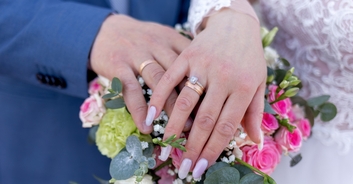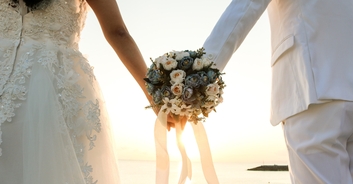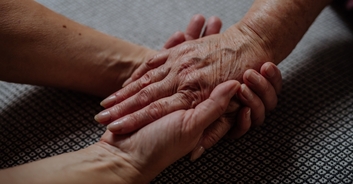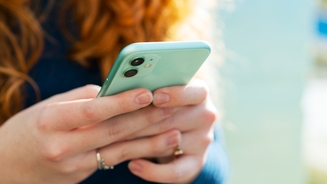From the moment we hit sexual maturity, the concept of virginity starts weighing down on us. At first, it's a subtle feeling; a mere hint. Like a grandparent nudging you in the ribs and saying, "so, have you got a boyfriend/girlfriend yet?" Gradually, it escalates, with each year adding more and more mass until - eventually - you feel like Atlas, carrying the weight of your empty sex life on your shoulders.
But when exactly is a normal time to "lose it"? Well, in the USA at least, the average person experiences their first time at the age of 17. This means that, if you're still inexperienced in the bedroom by the time you hit 18, you're in the minority. In fact, just 12.3 per cent of women and 14.3 per cent of men are still virgins in the age group of 20-24.
However, if you are still yet to experience the strange world that lies on the other side of a popped cherry, don't worry - you might just end up better off in life.
Paige Harden, a psychological scientist from the University of Texas at Austin, studied data taken from 1659 same-sex sibling pairs who were tracked from adolescence (around 16) to young adulthood (around 29) in order to find out whether the age at which people lose their virginity affects them later on in life to any noticeable degree.
Each person in the study was labeled as having lost their virginity early (before the age of 15), on time (aged 15-19), or late (older than 19). This was then compared to various aspects of their lives, and what they found was that those who fit into the "late" category were usually more satisfied with their relationships than those who had lost their V cards earlier on in life.
The correlation between the two factors was so strong, in fact, that it remained true even when genetic and environmental factors were taken into account, and were not written off as anomalies when educational attainment, income, religiousness, BMI, or attractiveness were considered, either.
According to Harden, there are several different reasons why this relationship between the age of losing one's virginity and later happiness might exist.
The first possibility is that people who have sex for the first time when they're older might only do so because they are naturally pickier than most, and won't opt for a relationship unless they know that it will be satisfying in the long term - as opposed to the horny teenagers who just went for anyone that was game.
The converse may also be true, however, and that it is the lateness of losing one's virginity that affects a person's attitude towards relationships, rather than vice versa. Basically, because they never had to deal with a poor-quality teenage relationship (which may or may not have involved aggression or victimization), they won't carry those same expectations and apprehensions into a later partnership.
But Harden also notes that it's possible that "individuals who first navigate intimate relationships in young adulthood, after they have accrued cognitive and emotional maturity, may learn more effective relationship skills than individuals who first learn scripts for intimate relationships while they are still teenagers."
Basically, then, people who hold off on disembarking the virginity train might find themselves ending up in a happier, stronger relationship further on down the line - meaning it's almost certainly worth the wait.




.jpg_IJcPYx?tr=h-40)
.jpg_W5wtoW?tr=h-40&config=JTdCJTIybmFtZSUyMiUzQSUyMnBob25lMSUyMCgxKS5qcGclMjIlMkMlMjJhbHRlcm5hdGl2ZV90ZXh0JTIyJTNBJTIycGhvbmUxJTIwKDEpLmpwZyUyMiUyQyUyMmNhcHRpb24lMjIlM0ElMjJUaW0lMjBSb2JiZXJ0cyUyRkdldHR5JTIyJTJDJTIyY29vcmRpbmF0ZXMlMjIlM0ElN0IlMjJkZXNrdG9wJTIyJTNBJTdCJTIybGVmdCUyMiUzQTAlMkMlMjJ0b3AlMjIlM0EwJTJDJTIycmlnaHQlMjIlM0ExJTJDJTIyYm90dG9tJTIyJTNBMC41MiU3RCUyQyUyMnRhYmxldCUyMiUzQSU3QiUyMmxlZnQlMjIlM0FudWxsJTJDJTIydG9wJTIyJTNBbnVsbCUyQyUyMnJpZ2h0JTIyJTNBbnVsbCUyQyUyMmJvdHRvbSUyMiUzQW51bGwlN0QlMkMlMjJtb2JpbGUlMjIlM0ElN0IlMjJsZWZ0JTIyJTNBbnVsbCUyQyUyMnRvcCUyMiUzQW51bGwlMkMlMjJyaWdodCUyMiUzQW51bGwlMkMlMjJib3R0b20lMjIlM0FudWxsJTdEJTdEJTJDJTIyd2lkdGglMjIlM0ExNTM1JTJDJTIyaGVpZ2h0JTIyJTNBODAwJTdE)




.jpg_IJcPYx?tr=h-184)
.jpg_W5wtoW?tr=h-184&config=JTdCJTIybmFtZSUyMiUzQSUyMnBob25lMSUyMCgxKS5qcGclMjIlMkMlMjJhbHRlcm5hdGl2ZV90ZXh0JTIyJTNBJTIycGhvbmUxJTIwKDEpLmpwZyUyMiUyQyUyMmNhcHRpb24lMjIlM0ElMjJUaW0lMjBSb2JiZXJ0cyUyRkdldHR5JTIyJTJDJTIyY29vcmRpbmF0ZXMlMjIlM0ElN0IlMjJkZXNrdG9wJTIyJTNBJTdCJTIybGVmdCUyMiUzQTAlMkMlMjJ0b3AlMjIlM0EwJTJDJTIycmlnaHQlMjIlM0ExJTJDJTIyYm90dG9tJTIyJTNBMC41MiU3RCUyQyUyMnRhYmxldCUyMiUzQSU3QiUyMmxlZnQlMjIlM0FudWxsJTJDJTIydG9wJTIyJTNBbnVsbCUyQyUyMnJpZ2h0JTIyJTNBbnVsbCUyQyUyMmJvdHRvbSUyMiUzQW51bGwlN0QlMkMlMjJtb2JpbGUlMjIlM0ElN0IlMjJsZWZ0JTIyJTNBbnVsbCUyQyUyMnRvcCUyMiUzQW51bGwlMkMlMjJyaWdodCUyMiUzQW51bGwlMkMlMjJib3R0b20lMjIlM0FudWxsJTdEJTdEJTJDJTIyd2lkdGglMjIlM0ExNTM1JTJDJTIyaGVpZ2h0JTIyJTNBODAwJTdE)
